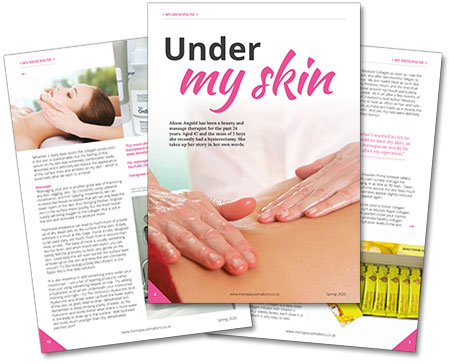Skin, Hair & Beauty
Article contributed by:
Alison Angold
Magazine article - Collagen: "Under my skin"
Collagen is a protein found in the skin. It is made up of small fibres that sit together under the skins surface to make the skin plump and firm. Think of it as the scaffolding that is holding the skin up – without it our skin will fall, loose firmness, and the lines and wrinkles appear more apparent and/or deeper.
During menopause, the depletion of collagen is accelerated due to the lack of oestrogen in the body – oestrogen supports the production of collagen, so without it, or fluctuating levels of it, it cannot produce as well as it once did.
There are treatments that stimulate the production of collagen by stimulating an inflammatory response in the skin, but these can be painful and invasive. A much safer, and easier way to mimic an inflammatory response, is to use vigorous movements on our skin, and to literally slap yourself! It sounds really strange, but this will not only increase the blood circulation to our skin, which will help feed all our skin cells, but it may have the effect of calling the collagen producing cells, to the area as it thinks an injury is occurring. Do this daily when applying your face cream or oil. See my video on Instagram » for simple slapping techniques!
Retinol is the only proven ingredient that stimulates the type of collagen needed to tone and firm the skin and reduce lines and wrinkles, so this is a must as we travel through menopause. Retinol encourages cell turnover, so the cells travelling to the surface of the skin are fresher, smoother and brighter – giving more of a glow to the skins surface. Used over time the retinol also strengthens the cells and slows down the depletion of collagen. However, if you are new to using retinol, take care. You need to start slowly if using retinol for the first time and you also must be using a SPF during the day, to protect the new cells coming to the skins surface.
Collagen starts off as something called procollagen. Our body has the ability to make procollagen but needs the amino acids, glycine and proline to do so, and vitamin C to enable it. To maximise this process, we can take in these in our diet Find these essential, collagan boosting proteins in the following foods:
- Glycine can be found in tofu, black beans, kidney beans, pumpkin seeds, sunflower seeds and chia seeds and pistachio and cashew nuts.
- Proline can be found in wheat germ, cabbage, seaweed, asparagus and watercress.
- Vitamin C is found in abundance in citrus fruits, red, yellow and orange peppers and strawberries
For the full article, lots more advice, tips, products, recipes and the science of how to boost collagen in the skin » see my blog article.
- Alison Angold


